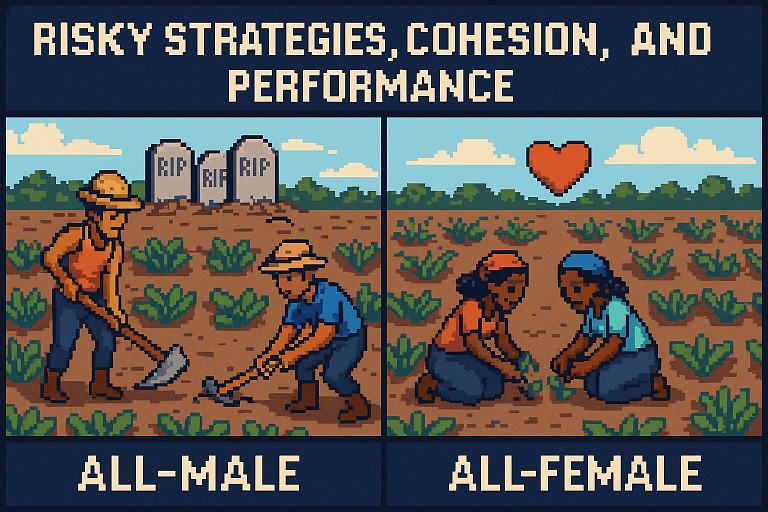Men Take Risks, Women Win Games? A Study of Team Behavior

Men are more risky, while women are better at bonding with others—stereotypes, but is there actually something to it? Using a video game, the researchers analyzed the behavior of all-men and all-women teams. Their findings have implications for esports teams and us, the average gamer.
• Team cohesion is an important factor in team performance. But differences between all-male and all-female teams are unknown.
• Males usually show more risk-taking behavior, potentially leading to different tactics in-game.
• All-female teams had higher scores for median team cohesion and satisfaction.
• All-male and all-female teams differed in their choices of strategy, with male teams showing a wider range — interpreted as more risky.
• Being aware of behavioral differences between males and females may give you a crucial advantage in your games.
❓ Why Does Sex Differences in Teams Matter?
As frequent readers of this newsletter, you know that team cohesion is a big thing when it comes to performance. Typically, research on this topic in gaming is dominated by teams consisting of males only. This is due to the fact that, according to many studies, players of competitive video games (Dota, League of Legends, Counter-Strike, etc.) are typically male — in the range of 80% or more.
As a consequence, looking at differences between how male and female teams behave is typically not explored. "In addition to differences in team cohesion and team member satisfaction, we were also able to examine any gender differences with respect to overall game strategy..." [1] Furthermore, men are known to be more risky than women. This may also show in strategies that men choose.
15 (six females, and nine males) players participated in the study, playing The African Farmer Game—a game that simulates the the life of a farmer's family in Africa. The goal is to, depending on the environment such as the weather, plant crops, divide labor, and have your family members survive. "The participants formed seven teams, three of which were all female, and four all male." [1]
"The African Farmer Game requires the teams to make a series of decisions with incomplete information." [1]
🏆 How Did Male and Female Teams Perform?

As you can see in the tables above, differences between the female and male teams emerged. All-female teams had higher scores of median team cohesion and satisfaction (across all four subfactors).
"The all-female teams were more diligent about weeding their fields and made fewer mistakes in task allocation (e.g. allocating too many jobs to a single family member, or attempting tasks when they did not have the necessary assets) that led to task failure."
This highlights another finding: male and female teams differed in their choice of strategy. Choosing a wider range of strategies was interpreted as greater risk-taking. Instead of just weeding the fields, male teams also attempted selling labor and planting different crops.
"Overall the outcomes for the female teams were significantly better than those of the male teams by these measures, with fewer household fatalities and greater final assets." [1]
At the end of the game, female teams had more in-game currency. Meanwhile, the all-male teams faced more dire outcomes: after losing multiple household members, some teams had to use "reincarnation" to allow the teams to continue playing. In other words, their family would have died out if this was real life. A comparison of some in-game measures are shown in the table below.

"We found that all-female teams reported higher levels of team cohesion and team member satisfaction, and that all-male teams employed a wider range of tactics, which were considered to be of greater risk." [1]
📈 How To Improve
Citing a study from the 90s, the researcher argue "that girls begin playing in small, cooperative groups from an early age and continue this through to adulthood". Boys, on the other hand, act more competitively, which develops into an element of their friendship with others [2]. This may explain—in part—the difference in team cohesion and satisfaction.
Ok, how do we apply this to video games? As an average player who might want to rank up, you should be aware that your enemy team will consist of mostly males. What comes with it is a higher appetite for risk. As a consequence, playing League, Dota, CS or what ever, you can expect risky tactics. Being aware of that might give you a crucial advantage to winning more lane fights, 1v1s, getting less ganked etc.
This could, in theory, lead to a higher chance of winning more games and climbing the ladder. You may also become aware of your own risky moves and behavior that may cost you games. At the same time, if you—somehow know—you're playing with a woman, be aware that she'll likely play more conservative.
Thanks for reading, and don't tower dive too much. See you next week,
Christian 🙂







